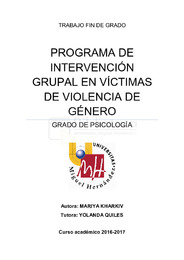Please use this identifier to cite or link to this item:
https://hdl.handle.net/11000/6374Full metadata record
| DC Field | Value | Language |
|---|---|---|
| dc.contributor.advisor | QUILES, YOLANDA | - |
| dc.contributor.author | Kharkiv, Mariya | - |
| dc.contributor.other | Departamentos de la UMH::Psicología de la Salud | es |
| dc.date.accessioned | 2020-09-16T11:15:50Z | - |
| dc.date.available | 2020-09-16T11:15:50Z | - |
| dc.date.created | 2017-06 | - |
| dc.date.issued | 2020-09-16 | - |
| dc.identifier.uri | http://hdl.handle.net/11000/6374 | - |
| dc.description.abstract | La violencia en las relaciones de pareja es la causa más frecuente de sufrimiento psicológico en las mujeres. Se trata de un problema poco visible en la sociedad, con un creciente número de víctimas y altas probabilidades de reincidencia. La violencia psicológica tiene consecuencias sobre la salud de las personas que van desde la depresión hasta las autolesiones o el suicidio, pasando por síntomas físicos y psicosomáticos que tenderán a ser crónicos si no se realiza ningún tratamiento. El objetivo de realizar un programa de intervención grupal es mejorar el ajuste psicológico y social, así como la salud y el bienestar de las mujeres maltratadas. El programa se compone de 8 sesiones, en las que se trabajarán las consecuencias emocionales, cognitivas y conductuales del maltrato. La intervención está dirigida a mujeres de entre 25 y 45 años que sufren o han sufrido violencia física, sexual y/o psicológica por parte de sus parejas o ex parejas y que presenten disfunciones psicosociales. Las sesiones serán integradas por grupos de entre 6 y 10 personas, con la finalidad de fomentar la participación y la libre expresión. Para cuantificar la eficacia de la intervención se administrará una batería de test pre y post evaluativa, compuesta por una entrevista semiestructurada para víctimas de maltrato doméstico, la Escala de Gravedad de Síntomas del Trastorno de Estrés Postraumático, el Inventario de Ansiedad-Estado, el Inventario de Depresión de Beck, la Escala de Autoestima y la Escala de Inadaptación. Palabras clase: | es |
| dc.description.abstract | Violence in relationships is the most common cause of psychological distress in women. This problem is not so evident in a society with a growing number and a high probability of recidivism. Psychological violence has consequences on people’s health ranging from depression to self-harm or suicide, to physical and psychosomatic symptoms which will become chronic if no treatment is performed. The goal of a group intervention program is the improvemen of psychological and social adjustment, as well as the health and well-being of abused women. The program consists of 8 sessions, which will work on the emotional, cognitive and behavioral consequences of abuse. Such intervention is aimed at women aged between 25 and 45 years who suffer or have suffered physical, sexual and / or psychological violence by their partners or ex-partners, and showing also psychosocial dysfunctions. These sessions will be composed of groups of between 6 and 10 people, for the purpose of encouraging participation and free expression. In order to quantify the efficacy of the intervention, a battery of pre and post evaluative tests will be administered, consisting of a semi-structured interview for victims of domestic abuse, The Severity of Symptom Scale of Posttraumatic Stress Disorder, State Anxiety Inventory, Beck´s Depression Inventory, Self-Esteem Scale and Inadaptation Scale. | es |
| dc.format | application/pdf | es |
| dc.format.extent | 42 | es |
| dc.language.iso | spa | es |
| dc.rights | info:eu-repo/semantics/openAccess | es |
| dc.subject | violencia de género | es |
| dc.subject | gender-based violence | es |
| dc.subject | mujeres maltratadas | es |
| dc.subject | battered woman | es |
| dc.subject | goup intervention | es |
| dc.subject.other | CDU::1 - Filosofía y psicología::159.9 - Psicología | es |
| dc.title | Programa de Intervención Grupal en víctimas de violencia de género | es |
| dc.type | info:eu-repo/semantics/bachelorThesis | es |

View/Open:
KHARKIV, MARIYA.pdf
837,48 kB
Adobe PDF
Share:
Admin Tools
.png)
